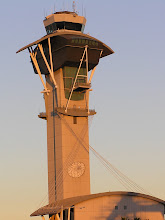For all of you who are thinking that you want to be an air traffic controller (and I know you are!), consider the following, written by a veteran controller who is counting the months until her retirement:
All of the above is true, and yet I still love the job (most of the time); after all, where else could I get paid to look out the window all day long and tell people where to go?
For job application information, go to the FAA's website:
http://www.faa.gov/jobs/job_opportunities/airtraffic_controllers/
See also the National Air Traffic Controller's Association (NATCA) website:
http://www.natca.org/
| Put down your copy of Pushing Tin The truth is, the job sucks - Even for those of us who LOVE it: We are not appreciated by those that we protect; We save and protect more lives on a daily basis than any other profession. The pilots don't understand - or even listen sometimes; Everything we say is recorded, and we are responsible to back it up in a court of law should the unthinkable happen. We are responsible for knowing more rules than humanly possible, yet No mistakes are allowed. We do have a God complex. We are in control: We control everything in our environment; It effects our personal life in ways that a non-controller (you) cannot imagine: Your spouse will not understand you or your job; You can't bring the job home - but you will have crash dreams; You will control traffic in your sleep; You cannot imagine the stress; You can never again tolerate a read-back error at a drive thru restaurant; Indecision is unacceptable in any scenario - especially from those you love. You will have a lack of tolerance in communication: You expect people to say what they mean and mean what they say. Life is black and white (yes, it is: there is no gray). Driving will never be the same again - you will use anticipated separation. Controllers come in 2 varieties: the home schooler/Bible thumpers or the drunks; Most start out as the former and end up as the latter. There is something "not right" about all of us; You will either look 10 yrs older than your age or 10 yrs younger than your age. You will be on blood pressure medication (not yet - but probably). You never get normal sleep (this sucks). You will work in the middle of the night and holidays (Christmas, Thanksgiving, Birthdays); You will never have "normal" days off; You will never have a regular social life; You can't participate in your kids school activities; Your friends won't understand that you can't leave work or get off work. People will think that you are the idiot on the ramp with the lights. You will be the last person a pilot talks to; you will hear the terror in his voice; You will never forget it - You will relive it again and again. You won't make the money that we do (or used to make before Bush). In our own minds, We are unbelievably hard on each other (ridiculously hard); Thick skin is a requirement (no crying allowed): When you fail we will laugh at you (and laugh hard we will); When you succeed we won't acknowledge it (it's your job - so what). If we are laughing on the radio, chances are.....we ARE laughing at you! | |
For job application information, go to the FAA's website:
http://www.faa.gov/jobs/job_opportunities/airtraffic_controllers/
See also the National Air Traffic Controller's Association (NATCA) website:
http://www.natca.org/








